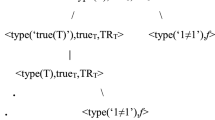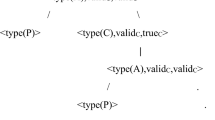Abstract
In this paper I present three problems for Simmons’ singularity theory of truth as he presents it in Universality and the Liar. I begin with a brief overview of the theory and then present the three problems I see for it.
The first problem shows that the singularity theory is in conflict with our ordinary notion of truth. I present a set of sentences that the singularity theory evaluates differently than does our pretheoretic concept of truth.
The second problem shows that Simmons’ theory is incomplete, in the sense that there are sentences of its object language of which it does not have the resources to evaluate.
The third problem suggests that Simmons theory does not, contrary to the claim of the book, allow for semantic universality. I consider Simmons’ extension of the singularity theory to accommodate truth-in-a-context and show that it is inconsistent with his basic theory. Specifically I present a sentence which diagonalizes out of the basic theory.
Similar content being viewed by others
Author information
Authors and Affiliations
Rights and permissions
About this article
Cite this article
Hardy, J. Three Problems for the Singularity Theory of Truth. Journal of Philosophical Logic 26, 501–520 (1997). https://doi.org/10.1023/A:1004298718137
Issue Date:
DOI: https://doi.org/10.1023/A:1004298718137




